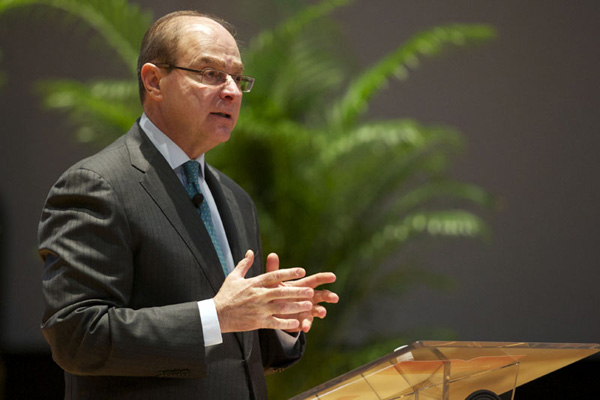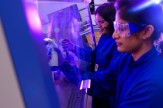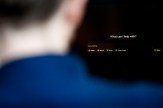Aoun: ‘We need to be a model for society’

President Joseph E. Aoun presented his vision for a more perfect Northeastern University on Monday afternoon, urging students, faculty, and staff to embrace their diversity in order to reveal the community’s true strength, resilience, and vitality.
“It is through the integration of our differences that we truly thrive as a community,” Aoun told a packed Fenway Center. “It is through this plurality that we live up to our highest calling—to be a community dedicated to human advancement.”
He framed his 30-minute speech on diversity and inclusion by explaining that some have recently questioned the university’s values and commitment to core principles such as academic freedom and fairness.
“Let me be clear,” Aoun said. “If anyone in this community feels that they are not full members of the Northeastern family, that is unacceptable. If anyone in this community has ever felt marginalized because of her faith, color, orientation, or beliefs, that is unacceptable.”
Aoun underscored the point by sharing a series of stories highlighting Northeastern’s culture of inclusion, mutual respect, and understanding across religious traditions. After the university’s Menorah was vandalized in November, Aoun explained, students of Northeastern’s Islamic student group wrote a heartfelt letter that they shared with Northeastern Hillel. The letter read, in part, “We stand in solidarity with our Jewish brothers and sisters against all acts of hate, prejudice, and anti-Semitism.”
Aoun shared some personal anecdotes as well, including stories of growing up in Beirut, Lebanon. “Unfortunately, my native country was torn apart by a war of religions. I lost friends and families. I lost classmates in the name of religion. This was unacceptable to me and it remains unacceptable today.”

In a speech on Monday afternoon in the Fenway Center, President Joseph E. Aoun urged Northeastern students, faculty, and staff to embrace their diversity.
Aoun also announced the formation of the Presidential Council on Diversity and Inclusion. The council will be comprised of students, faculty, and staff and co-chaired by law professor James Hackney and Uta Poiger, interim dean of the College of Social Sciences and Humanities.
As part of the council’s activities, William Fowler, Distinguished Professor of History, and William Wakeling, dean of the university libraries, will undertake a thorough investigation of Northeastern’s past.
“Like many of our peer institutions, we have reason to believe that there may be chapters in our history that we are not proud of,” Aoun said. “We will thoroughly review our archive and we will share what we find.”
In addition to Hackney, Poiger, Fowler, and Wakeling, other members of the council are: Agnes Chan, professor and associate dean in the College of Computer and information Science; Dick Daynard, University Distinguished Professor and chair of the Faculty Senate Agenda Committee; Michael Dukakis, Distinguished Professor; Phil He, associate professor and associate vice provost; Rehan Khan, vice president for Information Services; Alex Kern, director of the Center for Spirituality, Dialogue and Service; Lori Lefkovitz, professor and director of Jewish Studies; Zach Pardey, president of the Graduate Student Association; Peter Petrin, president of the Student Government Association; Carmen Sceppa, associate professor of health sciences; and Suzanna Walters, professor and director of Women’s Studies.
Aoun closed his speech by noting that one of the best parts of his job is attending campus events that celebrate different groups within the community, including the Veterans Day ceremony, the Martin Luther King, Jr. convocation, and the Holocaust Awareness Breakfast.
“These individual celebrations should not stand in isolation,” Aoun said. “While they are important and have deep meaning for the groups involved, they make up a much larger tapestry. This rich, diverse, and complex tapestry is the Northeastern community.”
He added that the university community should pursue a new “social compact” that allows every member of the university to participate fully and freely in all aspects of the institution. “Let us go forth and build this compact, one that is pluralistic, inclusive, and exciting,” he said.





